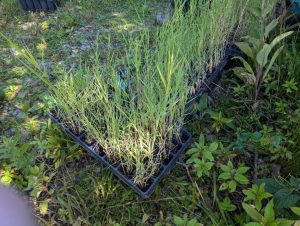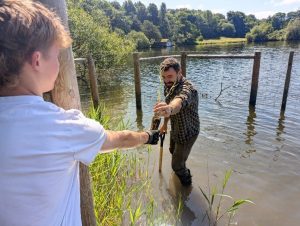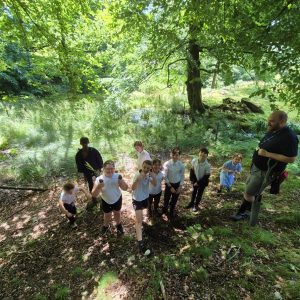I’m excited to share that I’ve recently embarked on an exciting new chapter as the Project Engagement Officer for South Cumbria Rivers Trust (SCRT). This is a role that combines my love for the environment and community engagement. I couldn’t be more thrilled to contribute to the conservation of the rivers and lakes of South Cumbria.
I’ve always had a deep interest in the natural world, which led me to pursue a degree in Physical Geography, giving me a solid foundation in understanding the complexities of ecosystems.
For the last seven years, I’ve been teaching Geography at Sedbergh School, where I’ve had the privilege of inspiring the next generation of environmental advocates. Teaching allowed me to bring my love of the landscape into the classroom, sharing the fascinating dynamics of rivers, ecosystems, and human-environment interactions with my students.
Growing up in South Lakeland, I’ve always harboured an appreciation for the beauty and fragility of this region’s natural environment. The area’s rivers, lakes, and wetlands are part of what makes it so special, but they also face significant pressures. This makes my new role with SCRT all the more meaningful.
What I’ll Be Working On
One of the most exciting parts of my role at SCRT is the opportunity to lead two crucial projects: Windermere STEP and Reedbed Restoration.
- South Cumbria Rivers Trust (SCRT) has launched the Windermere Septic Tank Emptying Project (STEP), in partnership with the Lake District Foundation (LDF). This programme, funded by the UK Government, aims to improve the health of Windermere’s freshwater environments by addressing pollution from private sewage systems. Over the next year, we will focus on four areas—Troutbeck, Grasmere, Far Sawrey, and Esthwaite, identified as pollution hotspots. Through home visits, collaboration with local councils, businesses and expert technical support, the initiative aims to tackle the challenges of non-mains drainage. It will include a free of charge septic tank emptying programme for high-risk properties. We will also development a new risk assessment tool and map private sewage infrastructure. The project also seeks to inform a national toolkit for private sewage management and will include monitoring and educational efforts to engage the local community and visitors.
- Reedbed Restoration: Reedbeds are one of our most important habitats. They provide essential services such as water filtration, flood mitigation, and biodiversity support. Unfortunately, many of the reedbeds in South Cumbria are in decline due to land use changes, development, boating and lake levels. Windermere has seen a 90% decrease in reedbeds since 1870. As part of this project, I’ll be leading efforts to restore these vital habitats, ensuring they continue to provide ecosystem services while supporting rare species.

What the Role Involves
As a Project Engagement Officer, my focus will be on building strong connections with local communities, schools, volunteers, and partners. I’m here to facilitate conversations about pollution in the Windermere catchment. Not only to encourage active participation in ongoing projects but to ensure that the wonderful people of South Cumbria are well-informed about the challenges facing our natural environment.
I’ll be running educational initiatives, community workshops and volunteer opportunities. I am particularly excited about involving young people in conservation efforts. Having been a teacher, I understand the importance of hands-on, engaging learning, and I’m eager to bring this into my work with SCRT. I recently visited Langdale C of E School where the pupils helped to sow reed plugs which will be used to replant some of Windermere’s damaged reedbeds. The children and staff were fantastic, and we hope to organise a day of planting in the autumn term.
If you’re interested in learning more about the Windermere STEP or Reedbed Restoration projects, or if you want to get involved, please get in touch. Together, we can make a tangible difference in preserving this beautiful region for years to come.
Stay tuned for future updates, and I look forward to connecting with all of you as we work to protect South Cumbria’s natural heritage.

Langdale C of E primary school – reed planting at the school pond
